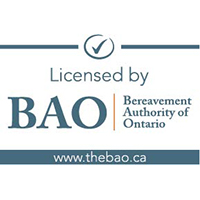
So you’ve been asked to write a eulogy for a loved one’s funeral or memorial service, and the thoughts and feelings you have in that moment are no doubt endless. You could feel honoured, overwhelmed, anxious and/or perhaps wondering how to even begin. Well, I have officiated hundreds of funerals and both written and listened to many tributes. And the following are seven tips for how to write a eulogy that everyone remembers.
Tip 1: Get clarity from the family on what exactly you’re being asked to do.
A eulogy is simply a speech that pays tribute to a person who has died, but what that looks like can be quite varied. It could be their whole life story that you cover in 10+ minutes. Alternatively, you could write about a few qualities that you like about them… or a simple anecdote that conveys the core of who they were in 2 or 3 minutes.
It’s likely that if you were a colleague, the family is hoping you will cover some of their work life. If you were a friend from high school, offer some memories from those teenage years. Either way, make sure you’re clear on what you’re being asked to do.
Tip 2: If possible, find out how many others are speaking and what their relationship was to the deceased. If you can, see if you can also get some insight on what they will be covering.
This will help you to be able to avoid repetition and also gauge an appropriate length when you write your eulogy. If you’re one of several speakers, I encourage you to keep it under 3 minutes.
Once I served a family who insisted on nine speakers, and four of them were the high school bandmates of the person who had died. All four of them got up there and reminisced about the same garage band rehearsals. It was painfully repetitive. (In this case, I would recommend one person speak on behalf of all four.)
Tip 3: There are no right or wrong ways to structure a eulogy. Just have a structure.
There is the option of the classic chronological structure where you share some stories of their journey from childhood to adulthood.
Maybe you write about your top three favourite qualities and share a story to back up each one.
If you are the only speaker, perhaps you will choose to focus on the different hats they wore in their life: a) wife, b) mother, c) grandmother, d) colleague/boss/mentor, e) friend/neighbour, etc. On a related note, if you’re in this boat, you may want to ask some of the people in their life for their insights, so you can speak on their behalf too.
I’ll never forget attending the funeral where there were about five speakers. They all went on about what a wonderful father, grandfather, colleague, mentor and friend he was. Yet no one spoke about him as husband to his poor wife sitting in the front row. Her name was only referenced once at the beginning of the service! So however you structure your eulogy, be sure all the bases are covered – whether by you or others speaking as well.
People often like to talk about how the person was “so generous” or “the kindest person”. But these kinds of generic statements aren’t as compelling as the examples or anecdotes you offer that demonstrate the kinds of qualities you admired. Your specific examples and stories will bring smiles to those listening who resonate with what you share.
What were some of their favourite sayings or things they used to say? Using their voice will also be cathartic for those listening.
Tip 5: It’s okay to be visibly sad and emotional.
I always offer two thoughts to my families who say they want to speak but are afraid of crying in front of others.
1) If you can’t cry at your _____ (mother/father/brother/sister)’s funeral, where can you cry? Expressing emotion shows how much the person meant to you. Plus, it also signals permission to those in attendance to express themselves in whatever ways they need to. An important part of the grieving process is allowing whatever emotions are inside of us to be released.
2) If the emotions become so overwhelming that the words stop coming out, you can ask a backup person (perhaps it’s the Celebrant or Clergy) to be ready to “pinch hit” for you if you need them to. As a Celebrant, I have “come to the rescue” of many people over the years who simply gave me the thumbs up, and I continued reading their speech for them. Often though, all they need is a pause and deep breath, and then they are able to continue on.
Tip 6: Don’t wing it. Type it out and print it out.
The benefits to planning out what you’re going to say and typing and printing it out are numerous:
1) Planning helps you hone in on exactly what you want to say.
2) It keeps you focused and on track (and finished in a timely manner!)
3) If you can send your speech to the officiant prior to the service, it helps her/him know where to place it in the order of the service so that it flows well with all of the other speeches and elements of the ceremony. Many Celebrants also send a copy of the service to the family afterwards, so when you email your speech to the Celebrant, it out allows for it to be part of this special keepsake.
4) Regarding Tip 5, if you need a “pinch hitter”, typing out your speech allows for it to be heard by the attendees – whether you’re able to deliver it or not.
5) And finally, printing it out helps to avoid any potential technical difficulties that can arise when reading off of a phone or tablet. (Plus, it just looks more professional in my opinion.)
Tip 7: Breathe deeply, relax and take some of the pressure off.
Finally, be reminded of the honour of being asked to speak about your loved one, and yes, it is normal to have some anxiety around wanting to make sure your eulogy is “just right”. (A pre-presentation meditation or doing something to care for yourself and “fill up your tank” may help you to relax.) But also understand that you don’t have to be Shakespeare with your writing or Churchill with your delivery.
Focus on the person you’re there to pay tribute to and the impact they made on your life and others’. When you do this, you’ll find that in writing your eulogy, it will come out exactly as it needs to be. It will be a) honouring of the person and b) helpful to you and everyone else as you say farewell to them.
So there you have it! Seven tips for how to write a eulogy that everyone remembers. We’d love to hear from you! What are some tips or ideas you have for writing a memorable eulogy? Feel free to share in the comments.








[…] In these cases, they need the Celebrant to wear the “storyteller” hat. Perhaps they’ve written the eulogy, and they are asking me to read it on their behalf. Other times, I will write a life tribute […]